2020 FIVB Volleyball Men's Nations League
The 2020 FIVB Volleyball Men's Nations League was originally to be the third edition of the FIVB Volleyball Men's Nations League, an annual men's international volleyball tournament. 2020 version of VNL originally was scheduled to start earlier than the previous edition due to the 2020 Summer Olympics in July. The preliminary phase was scheduled to be held in five weeks between May 22 and June 21, 2020. The final phase was scheduled to be held during July 1 to 5, 2020.[1]
| Tournament details | |
|---|---|
| Host nation | Cancelled (originally Italy) |
| City | Cancelled (originally Turin) |
| Dates | Cancelled (orginally 22 May – 5 July) |
| Teams | 16 (from 4 confederations) |
| Venue(s) | 21 (in 21 host cities) |
| Official website | |
| Volleyball Nations League | |
The final was supposed to take place in the United States but it got cancelled due to a clash with the U.S. Independence Day.[2] Later FIVB confirmed Turin, Italy, is the new host of Final stage of 2020 VNL,[3] but on March 13, 2020 FIVB decided to postpone the Nations League until after the 2020 Summer Olympics, but after Postponement of 2020 Summer Olympics to 2021, FIVB finally cancelled 2020 VNL caused by the COVID-19 pandemic.[4], but announced that Italy, is the host of Final stage of 2021 VNL.
Qualification
In the 2019 edition sixteen teams qualified for the competition. Twelve of them qualified as core teams which could not face relegation. Other four teams were selected as challenger teams which could be relegated from the tournament. Slovenia as winner of 2019 Challenger Cup earned the right to participate in this tournament replacing Portugal, the last placed challenger team after the 2019 edition.[5]
| Qualification | Qualifier |
|---|---|
| Core teams | |
| Challenger teams | |
Format
Preliminary round
The 16 teams compete in a round-robin format with every core team hosting a pool at least once. The teams are divided into 4 pools of 4 teams at each week and compete five weeks long, for 120 matches. The top five teams after the preliminary round join the hosts of the final round to compete in the final round.[1] The relegation takes into consideration only the 4 challenger teams. The last ranked challenger team will be excluded from the 2021 Nations League. The winners of the 2020 Challenger Cup will qualify for the next edition as a challenger team.
Final round
The six qualified teams play in 2 pools of 3 teams in round-robin. The top 2 teams of each pool qualify for the semifinals. The pool winners play against the runners-up in this round. The semifinals winners advance to compete for the Nations League title. The losers face each other in the third place match.
Pools composition
The overview of pools was released on September 13, 2019[1]
Preliminary round
| Week 1 | ||||
|---|---|---|---|---|
| Pool 1 United States |
Pool 2 Germany |
Pool 3 Poland |
Pool 4 Iran | |
| Week 2 | ||||
| Pool 5 Italy |
Pool 6 Russia |
Pool 7 Brazil |
Pool 8 Argentina | |
| Week 3 | ||||
| Pool 9 Slovenia |
Pool 10 Serbia |
Pool 11 Poland |
Pool 12 Japan | |
| Week 4 | ||||
| Pool 13 Japan |
Pool 14 Argentina |
Pool 15 Iran |
Pool 16 France | |
| Week 5 | ||||
| Pool 17 Canada |
Pool 18 Brazil |
Pool 19 Bulgaria |
Pool 20 France | |
Final round
| Pool A | Pool B |
|---|---|
Venues
Preliminary round
| Pool 1 | Pool 2 | Pool 3 | Pool 4 |
|---|---|---|---|
| Petersen Events Center | Arena Leipzig | Tauron Arena Kraków | Jiangmen Sports Center Gymnasium |
| Capacity: 12,508 | Capacity: 12,000 | Capacity: 18,000 | Capacity: 8,500 |
 |
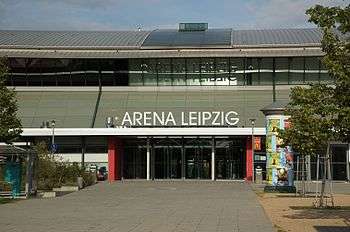 |
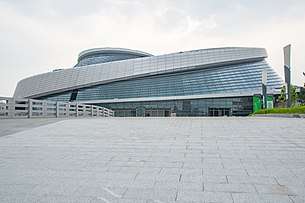 | |
| Pool 5 | Pool 6 | Pool 7 | Pool 8 |
| PalaRossini | Arena 2000 | Nilson Nelson Gymnasium | Beilun Gymnasium |
| Capacity: 6,000 | Capacity: 9,070 | Capacity: 11,150 | Capacity: 4,000 |
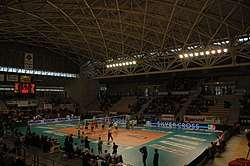 |
 |
||
| Pool 9 | Pool 10 | Pool 11 | Pool 12 |
| Arena Stožice | SC IBAR | Atlas Arena | Shimadzu Arena Kyoto |
| Capacity: 12,482 | Capacity: 3,350 | Capacity: 13,805 | Capacity: 5,016 |
.jpg) |
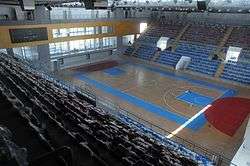 |
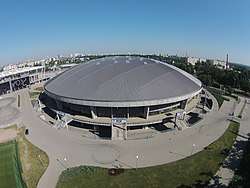 |
 |
| Pool 13 | Pool 14 | Pool 15 | Pool 16 |
| Toyama City Gymnasium | Estadio Aldo Cantoni | Azadi Indoor Stadium | Tianjin Arena |
| Capacity: 4,650 | Capacity: 8,000 | Capacity: 12,000 | Capacity: 10,000 |
 |
 |
 | |
| Pool 17 | Pool 18 | Pool 19 | Pool 20 |
| Winsport Arena | Ginásio Poliesportivo Avelino Dos Reis - Guanandizão | Palace of Culture and Sports | Palais des Sports Jean Weille |
| Capacity: 3,922 | Capacity: 8,240 | Capacity: 6,000 | Capacity: 6,027 |
| N/A | N/A | 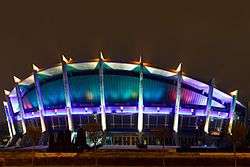 |
 |
References
- "FIVB ANNOUNCES HOST COUNTRIES FOR 2020 VNL". FIVB. September 13, 2019. Retrieved October 20, 2019.
- "VNL2020 - News detail - FIVB opens bidding process for 2020 VNL Men's Finals - Volleyball Nations League 2020". www.volleyball.world. Retrieved December 7, 2019.
- "News - Turin confirmed to host the 2020 men's VNL Finals". www.fivb.com. Retrieved December 20, 2019.
- "FIVB announces changes to events calendar". FIVB. March 13, 2020. Retrieved March 14, 2020.
- "Men's VNL Final Six lineup: How it all unfolded". FIVB. June 1, 2019. Retrieved August 27, 2019.
- https://www.volleyball.world/en/vnl/2020/competition/hostcities
External links
- Fédération Internationale de Volleyball – official website
- FIVB Volleyball Nations League – official website
_pictogram.svg.png)